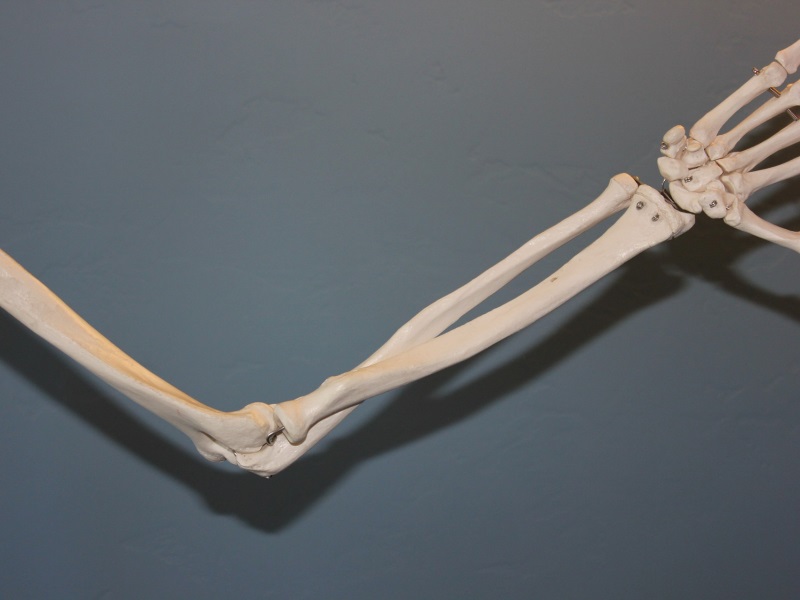- Home
- Science
- Science News
- Samples From ISS Astronauts Help Develop Real Time Bone Test
Samples From ISS Astronauts Help Develop Real-Time Bone Test

The researchers from Arizona State University and Minnesota-based Mayo Clinic measured calcium isotope ratios in urine from 30 shuttle astronauts - before, during and after the flights.
This allowed them to confirm that the test worked at high sensitivity.
"The big advantage of these measurements is that they show what is happening in the bone, whereas traditional bone health measurements show what has already happened," explained lead researcher Ariel Anbar from Arizona State University in a statement.
Using mass spectrometry, the new method can discern the relative ratios of the calcium isotopes 42Ca and 44Ca in bone.
By measuring the ratios of the two isotopes in blood or urine, scientists can calculate the rate of change of bone mass.
"This means that we can have a real near-time view of what is happening in the bone, rather than comparing before and after, when damage may have already been done," he noted.
In space, because of zero gravity conditions, astronauts experience very rapid bone loss.
"We were able to confirm that Ca isotopes of the shuttle shifted as expected, meaning that we could see in more or less real time the ongoing bone loss. We did this using a simple urine sample, taken at various points during their flights," Anbar elaborated.
The researchers also looked at a group of 71 patients who either had multiple myeloma (bone cancer) or were at risk of multiple myeloma.
"Those patients who tended to lose the lighter 42Ca isotope seemed to be the ones where the cancer was the most active," the authors noted.
This means that the tests could feed into decisions on whether or not to treat a patient, for example if a cancer was dormant or growing very slowly, and to assess the effectiveness of treatments.
"From a scientific point of view, we are delighted that we have the chance to combine geochemistry, biology, and space science to benefit patients," Anbar said.
"By using calcium isotope ratios, healthcare providers may be able to optimise therapies for these debilitating illnesses in the future," commented Scott Parazynski, former Nasa astronaut.
Catch the latest from the Consumer Electronics Show on Gadgets 360, at our CES 2026 hub.
Related Stories
- Samsung Galaxy Unpacked 2025
- ChatGPT
- Redmi Note 14 Pro+
- iPhone 16
- Apple Vision Pro
- Oneplus 12
- OnePlus Nord CE 3 Lite 5G
- iPhone 13
- Xiaomi 14 Pro
- Oppo Find N3
- Tecno Spark Go (2023)
- Realme V30
- Best Phones Under 25000
- Samsung Galaxy S24 Series
- Cryptocurrency
- iQoo 12
- Samsung Galaxy S24 Ultra
- Giottus
- Samsung Galaxy Z Flip 5
- Apple 'Scary Fast'
- Housefull 5
- GoPro Hero 12 Black Review
- Invincible Season 2
- JioGlass
- HD Ready TV
- Laptop Under 50000
- Smartwatch Under 10000
- Latest Mobile Phones
- Compare Phones
- Honor Magic 8 RSR Porsche Design
- Honor Magic 8 Pro Air
- Infinix Note Edge
- Lava Blaze Duo 3
- Tecno Spark Go 3
- iQOO Z11 Turbo
- OPPO A6c
- Samsung Galaxy A07 5G
- Lenovo Yoga Slim 7x (2025)
- Lenovo Yoga Slim 7a
- Lenovo Idea Tab Plus
- Realme Pad 3
- Moto Watch
- Garmin Quatix 8 Pro
- Haier H5E Series
- Acerpure Nitro Z Series 100-inch QLED TV
- Asus ROG Ally
- Nintendo Switch Lite
- Haier 1.6 Ton 5 Star Inverter Split AC (HSU19G-MZAID5BN-INV)
- Haier 1.6 Ton 5 Star Inverter Split AC (HSU19G-MZAIM5BN-INV)







![[Sponsored] Haier C90 OLED TV | Dolby Vision IQ, 144Hz OLED and Google TV in Action](https://www.gadgets360.com/static/mobile/images/spacer.png)









